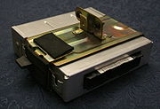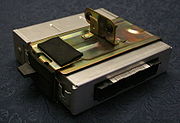
Electronic control unit
Encyclopedia

Automotive industry
The automotive industry designs, develops, manufactures, markets, and sells motor vehicles, and is one of the world's most important economic sectors by revenue....
electronics, electronic control unit (ECU) is a generic term for any embedded system
Embedded system
An embedded system is a computer system designed for specific control functions within a larger system. often with real-time computing constraints. It is embedded as part of a complete device often including hardware and mechanical parts. By contrast, a general-purpose computer, such as a personal...
that controls one or more of the electrical systems or subsystems in a motor vehicle
Motor vehicle
A motor vehicle or road vehicle is a self-propelled wheeled vehicle that does not operate on rails, such as trains or trolleys. The vehicle propulsion is provided by an engine or motor, usually by an internal combustion engine, or an electric motor, or some combination of the two, such as hybrid...
.
Types of ECU include Electronic/Engine Control Module (ECM), Powertrain Control Module (PCM), Transmission Control Module (TCM), Brake Control Module (BCM or EBCM), Central Control Module (CCM), Central Timing Module (CTM), General Electronic Module (GEM), Body Control Module (BCM), Suspension Control Module (SCM), control unit, or control module. Taken together, these systems are sometimes referred to as the car's computer. (Technically there is no single computer but multiple ones.) Sometimes one assembly incorporates several of the individual control modules (PCM is often both engine and transmission)
Some modern motor vehicles have up to 80 ECUs. Embedded software
Embedded software
Embedded software is computer software that plays an integral role in the electronics it is supplied with.Embedded software's principal role is not Information technology , but rather the interaction with the physical world. It's written for machines that are not, first and foremost, computers...
in ECUs continue to increase in line count, complexity, and sophistication. Managing the increasing complexity and number of ECUs in a vehicle has become a key challenge for original equipment manufacturers (OEMs).
Types of electronic control units
- AirbagAirbagAn Airbag is a vehicle safety device. It is an occupant restraint consisting of a flexible envelope designed to inflate rapidly during an automobile collision, to prevent occupants from striking interior objects such as the steering wheel or a window...
Control Unit (ACU) - Body Control ModuleBody Control ModuleIn automotive electronics, Body Control Module is a generic term for an Electronic control unit responsible for monitoring and controlling various electronic accessories in a vehicle's body....
controls door locks, electric windows, courtesy lights, etc. - Convenience Control Unit (CCU)
- Door Control Unit
- Engine Control UnitEngine control unitAn engine control unit is a type of electronic control unit that determines the amount of fuel, ignition timing and other parameters an internal combustion engine needs to keep running...
(ECU)—not to be confused with electronic control unit, the generic term for all these devices - Electric Power Steering Control Unit (PSCU)— Generally this will be integrated into the EPS powerpack.
- Man Machine Interface (MMI)
- Powertrain Control ModulePowertrain Control ModuleA Powertrain Control Module, abbreviated PCM, is an automotive component, an electronic control unit , used on motor vehicles. It is generally a combined control unit, consisting of the engine control unit and the transmission control unit. It commonly controls more than 5 factors in the car or...
(PCM): Sometimes the functions of the Engine Control UnitEngine Control UnitAn engine control unit is a type of electronic control unit that determines the amount of fuel, ignition timing and other parameters an internal combustion engine needs to keep running...
and Transmission Control UnitTransmission Control UnitA transmission control unit or TCU is a device that controls modern electronic automatic transmissions. A TCU generally uses sensors from the vehicle as well as data provided by the Engine Control Unit to calculate how and when to change gears in the vehicle for optimum performance, fuel economy...
are combined into a single unit called the Powertrain Control Module. - Seat Control Unit
- Speed Control UnitCruise controlCruise control is a system that automatically controls the speed of a motor vehicle. The system takes over the throttle of the car to maintain a steady speed as set by the driver.-History:...
- Telephone Control Unit (TCU)
- Transmission Control UnitTransmission Control UnitA transmission control unit or TCU is a device that controls modern electronic automatic transmissions. A TCU generally uses sensors from the vehicle as well as data provided by the Engine Control Unit to calculate how and when to change gears in the vehicle for optimum performance, fuel economy...
(TCU) - Brake Control Module (ABSAnti-lock braking systemAn anti-lock braking system is a safety system that allows the wheels on a motor vehicle to continue interacting tractively with the road surface as directed by driver steering inputs while braking, preventing the wheels from locking up and therefore avoiding skidding.An ABS generally offers...
or ESCElectronic stability controlElectronic stability control is a computerized technology that may potentially improve the safety of a vehicle's stability by detecting and minimizing skids. When ESC detects loss of steering control, it automatically applies the brakes to help "steer" the vehicle where the driver intends to go...
)

